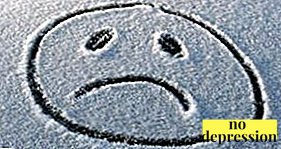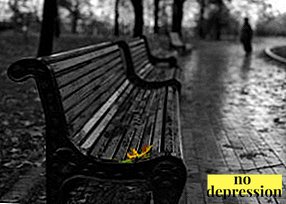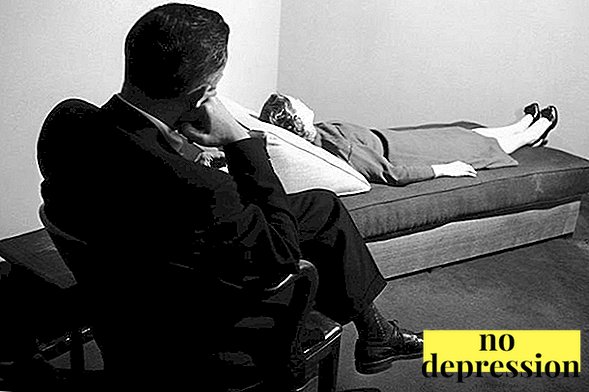Haunting you feeling of depression and melancholy?
Do you feel a breakdown and a strong desire to wrap yourself in a blanket and not go anywhere?
It became hard to wake up in the morning? It is likely that you have seasonal depression. What is it, how to recognize and overcome?
What it is?

Seasonal depression is a mood disorder in which depressive episodes occur. at about the same time every year.
In general, it is divided into two types:
- winter (from September to May);
- summer (from May to September).
Seasonal depression may appear aged 15-55, more common in 25 years. And the older a person is, the lower his susceptibility to this disorder.
Women are more likely to develop the disease. They have this disorder is more common than in men, about 4 times.
The disease manifests itself in different ways. For someone, it is mild, for someone more pronounced. In some cases, it may even have a significant impact on a person’s lifestyle and behavior.
Causes
Why does depression start? Scientists cite various causes of this disorder. The main ones include:
- Change in speed and frequency circadian rhythms day and night. Roughly speaking, a person has an internal biological clock.
- A deficiency in the human body of substances such as serotonin, dopamine, norepinephrine. They are also called the hormones of happiness.
 Restructuring of the body in hibernation mode. Such a reason can often be heard in relation to the winter depression.
Restructuring of the body in hibernation mode. Such a reason can often be heard in relation to the winter depression.- Climatic external influencessuch as air temperature and atmospheric pressure.
Where is the disorder?
The nervous system suffers tremendous stress when light day becomes very short, and on the street there is no sun and constant slush. Therefore, residents of the northern regions of Russia and Scandinavia are more susceptible than other seasonal depressions.
This was noted and the results of long-term observations of the World Health Organization. As for our country, not only the cities that are located above the Arctic Circle, but also St. Petersburg, Novosibirsk, Petrozavodsk.
It is proved that the further north, the more cases of depression recorded. So, there is evidence that in the US, 3% of the population suffers from seasonal disorder. It seems a little? But it is 9 million people.
Also, scientists have conducted studies, according to which it became known that in North America Seasonal depression occurs 2 times more often than in European countries. So there may be other factors, not just geographical location.
What is the difference between spring depression and autumn depression? Answer to the question:
How does it manifest itself?

Let's immediately stipulate that if you move less in the winter, drink tea more with goodies and spend time in a rug with TV shows, then this is not depression.
To obtain such a diagnosis, the situation should be much more serious.
But anyway, consult a doctor will not hurt. Seasonal depression has the following symptoms and signs:
- decrease in mood, decrease in vital activity and vigor;
- decreased concentration and attentiveness;
- reduced ability to enjoy and rejoice;
- reduction of interest even to the fact that earlier brought a lot of positive emotions;
- the appearance of severe fatigue even after minor efforts;
- decrease in self-confidence and self-esteem;
- winding himself up in a negative way, constant thoughts about his own worthlessness and culpability of something;
- decrease in sexual desire or its complete loss.
In addition, we call more specific symptomswhich are not found in all:
- feeling of drowsiness throughout the day, increased need for sleep;
- difficulty with morning rises;
- weight gain, increased appetite;
- decreased concentration and memory loss;
- the appearance of problems with the performance of customary duties;
- avoiding social contacts, reducing communication with friends and family;
 desire to be isolated from everyone;
desire to be isolated from everyone;- avoidance of habitual activity in any manifestations;
- deterioration of the general condition in the morning and its improvement in the evening.
Note also that doctors call seasonal depression a type of ordinary depression.
It differs only pronounced seasonal nature and specific symptoms (which are observed together with the main ones).
Therefore, you can not self-medicate and independently diagnose. It is better to consult a specialist.
Increased appetiteas a sign of winter depression:
What is dangerous?
Unfortunately, in our society there is a scornful attitude towards any depression, and especially to the seasonal one. It is believed that this condition is temporary, it will soon pass and does not bear much harm.

Therefore, many simply tolerate and wait for this condition to pass and refuse to turn to a psychotherapist.
As a result, some people with a similar disorder live for years. They think that such melancholy is just a trait of their character.
Often people with mood disorders are even blamed for their condition. From them you can hear: "Come on, do not be sad", "Do not hang your nose, everything will pass." But you can't joke with depression!
Permanent and often repeated depressed states have a direct impact on the state of our body. As a result, a person becomes apathetic, he is not interested in anything, he ceases to lead a normal social life. Even to close people it becomes difficult to communicate with him.
Depression is dangerous because the taste for life is lost, a feeling of depression appears, self-esteem decreases. This may result in the use of alcohol and psychotropic substances, as well as suicidal thoughts.
Which is why depression it is necessary to diagnose and treat.
How seasonal depression develops, how dangerous it is and how to fight it, in this video:
Diagnostics
Diagnosis of seasonal disorders should be carried out by a doctor. He will ask the necessary questions and assess your condition. As a rule, the diagnosis consists of the following steps:
 Detailed survey. You may be asked a lot of questions that will affect your mood, behavior and thoughts. They can clarify how your dream goes, how your relationships with your family and colleagues develop, and so on. This stage most often takes place in the form of a psychological questionnaire.
Detailed survey. You may be asked a lot of questions that will affect your mood, behavior and thoughts. They can clarify how your dream goes, how your relationships with your family and colleagues develop, and so on. This stage most often takes place in the form of a psychological questionnaire.- Examination of the physical condition. It is necessary to check your overall condition, vitality.
- Analyzes. In general, there are no established standards for taking medical tests for seasonal depression. Nevertheless, a specialist may ask for donation of blood and other tests, in order to clarify the diagnosis.
As we have already noted, other types of depression and mental disorders may have similar symptoms with seasonal depression. Therefore it is also necessary so that the doctor clarifies the following symptoms:
- there are no other explanations for explaining a change in behavior or mood;
- periods of frustration are replaced by periods of his absence (for example, you are depressed in winter, but in summer everything is fine);
- These symptoms you experience at least a couple of years in a row.
How to recognize the autumn depression and how to get rid of it? The psychologist comments:
Treatment
What to do? How to cope with seasonal blues?
You have been diagnosed with seasonal depression. What's next? Depending on the complexity of your disorder can use a variety of treatment methods.

For example, winter depression is well treated by psychotherapeutic techniques, light therapy and monoamine oxidase inhibitors.
As for the summer, it is most often used antidepressants.
With this use of drug treatment in order to get out of depression, advisable in the following cases:
- there is a positive reaction to mood stabilizers and antidepressants;
- there is a high risk of suicidal acts;
- there are visible violations in social or professional activities;
- there are significant functional impairment;
- there is a severe course of depression;
- According to the results of psychotherapy or phototherapy, there are no results.
Cognitive-behavioral therapy is also an effective method. It will be worthwhile to offer the patient special diet and exercise complex.
As for light therapy, it consists of a course of sessions, each of which lasts about 15-45 minutes. This method is concluded in that a full range of bright light is sent to the patient's eyes. It is known that this leads to a decrease in production melatonin (cause drowsiness) and increase serotonin.
Modern studies have shown that conducting phototherapy sessions along with taking a course of antidepressants lead to positive results.
How to survive the winter depression? Useful tips:
Prevention

Unfortunately, at the present moment a method has been invented to save a person from an exacerbation of seasonal disorder.
Therefore, patients often begin treatment long before the first symptoms appear, so that at least reduce the effect of depression on their lives.
If you have a seasonal deterioration in mood, but you have not been diagnosed with depression, you can carry out preventive actions aimed at improving your condition.
For this follow these guidelines:
- Try hard walk on the street at least an hour every day, and on sunny days, increase this time.
- Do not forget about the benefits of regular exercise. They significantly improve the overall condition and increase the tone.
Therefore, even if you feel very tired, try to persuade yourself at least for a 20-minute workout.
- If you notice that you feel better in the afternoon, then plan important things for the evening, and in the morning get something easy and enjoyable.
- Develop a steady regime of the day if you have such an opportunity. Wake up in the morning and go to bed at about the same time. If you sleep not enough or, on the contrary, it is very much - it can worsen your condition.
- Find a hobby. It can be like home: knitting, embroidery, drawing; and active: skating, snowboarding or skiing. The main thing is that you get pleasure from it.
 Review your wardrobe. Try to dilute the black and gray tones with bright colors.
Review your wardrobe. Try to dilute the black and gray tones with bright colors.- Clean up. Get rid of the trash, do what you have long wanted and constantly postponed.
The likelihood of seasonal depression is very high. Be attentive to your condition and do not be afraid to contact a specialist if you began to feel worse.

 Restructuring of the body in hibernation mode. Such a reason can often be heard in relation to the winter depression.
Restructuring of the body in hibernation mode. Such a reason can often be heard in relation to the winter depression. desire to be isolated from everyone;
desire to be isolated from everyone; Detailed survey. You may be asked a lot of questions that will affect your mood, behavior and thoughts. They can clarify how your dream goes, how your relationships with your family and colleagues develop, and so on. This stage most often takes place in the form of a psychological questionnaire.
Detailed survey. You may be asked a lot of questions that will affect your mood, behavior and thoughts. They can clarify how your dream goes, how your relationships with your family and colleagues develop, and so on. This stage most often takes place in the form of a psychological questionnaire. Review your wardrobe. Try to dilute the black and gray tones with bright colors.
Review your wardrobe. Try to dilute the black and gray tones with bright colors.

